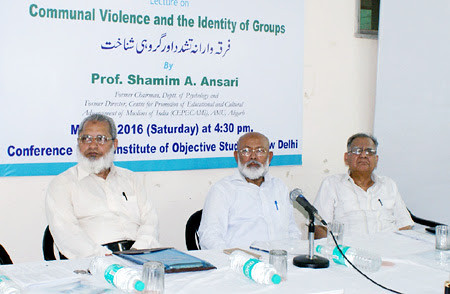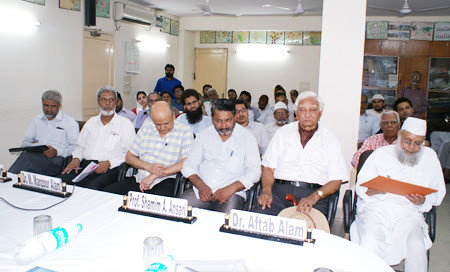By TCN News,
New Delhi: The Institute of Objective Studies (IOS) organized a lecture on “Communal Violence and the Identity of Groups” which was attended by several scholars, university teachers, social activists and prominent citizens.

The lecture was held here at its conference hall on Saturday.
Delivering the lecture, Shamim A. Ansari, Professor of Psychology at Aligarh Muslim University (AMU), observed that communal violence was one of the most vulnerable conditions that not only widened the gap among the groups, but was also detrimental to nation’s growth and development. Emphasizing the need for controlling communal violence for the sake of nation-building, he said that the identification of reasons for such a national social evil was very important.
Ansari held that post-Independence scenario witnessed frequent occurrence of communal tensions, usually turning into communal violence in which lives of innocent people and properties were lost. He explained that factors like, personal identity, social identity, prejudice, social alienation in the form of socio-economic and educational deprivation, reservation of Muslims, chauvinism of the majority community in the form of self-righteousness and perceived cultural superiority contributed to the eruption of communal violence. He also said that there had been several reasons for group identity crisis that might be seen in the light of historical perspective of groups residing in a particular society and the nation at large.
Ansari pointed out that the sense of belonging to the nation too had a role to play in certain situations. He proved his point by saying that the output in private sector was bigger than that of the public sector. This was due to the pressure on the workers to work maximally for the greater profit of the company. But no such thing happened in the public sector which incurred heavy losses due to non-performance of its workers. Holding that education and employment were co-related, he opined that the deprived must get an opportunity to develop. Owing to the presence of the holy Quran and Hadith, Muslims had a strong identity. Their teachings made the Muslims not to be fearful of death which was not found in any other religion. While lamenting that the media had failed to play an important role in creating an atmosphere conducive to peace and harmony, he said that the government, too, was found failing in its duty to promote brotherhood, communal and social harmony.

Prof. ZM Khan, Secretary General, IOS held that the communal violence was multi-dimensional. It could be studied from the angle of psychology, politics and sociology. Several scholars had studied the subject and drawn their conclusions. With the advancement of science and technology, the reach of social media was not bound by country or continent. Islamophobia was such a falsehood that gripped the world today, he said. He felt satisfaction that India was still safe from the scale of strife that was being witnessed in Syria and other countries of the Muslim world.
Dr. Mohammad Manzoor Alam, Chairman, IOS in his presidential remarks announced that the IOS would hold a national dialogue programme in the first week of September in which representatives from major religions would be invited to deliberate on communal harmony. An effort was made to put an effective curb on communal violence by bringing the Anti-Communal Violence Bill in Parliament, but the stiff resistance put up by the then main opposition party and the complicity of members of BJP stalled the bill.
He said that the communal forces in the country used violence as a tool to come to power. They successfully polarised Hindus against Muslims in their bid to attain power. They knew when and how to use a person in their sinister design to spark off communal violence. The rioters took advantage of the fact that the Muslims by nature were uncompromising on their identity. He held that during India’s freedom movement, the RSS had advised Hindus not to waste their energies on it and keep their power reserved for use against Muslims and the Christians when the time came. Calling Islam a religion of peace and well-being of the entire mankind, he noted that the Prophet of Islam (PBUH) freed the maximum number of slaves.
The programme was attended by Ammama Sabri, Prof. Shafiq Ahmed Khan Nadvi, Kamal Ahmad, Col. (retd.) Abdul Rasool Khan from USA, Dr. Tariq Ashraf, Mushtaq Ahmad Wani, Syed Ahmadullah, Afroz Alam Qasmi, Rashiduzzafar, Abdul Hafiz, Abdul Haq Falahi, Nihal Ahmad, Mohd. Minhaj Ahmad, Shakeelur Rahman, Qamar Ashraf, M. Shamsuddin, Safi Akhtar, Waseem Ahmad Fahmi and Dr. Bismil Aarfi among others.
